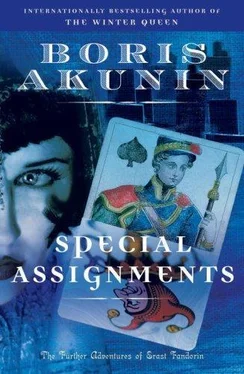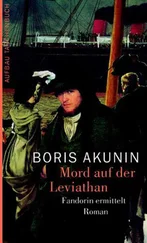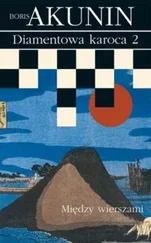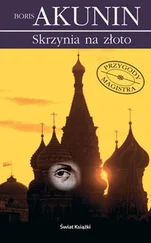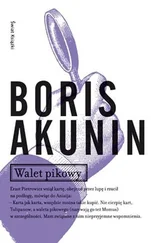Fandorin glanced briefly in the direction of the morgue building, where several men were waiting, shifting from one foot to the other. 'I thought I made it clear: don't do anything. All right, let's go.'
Out of sorts, Lyalin decided. Which was hardly surprisingly in such sad circumstances. The man was threatened with the ruin of his career and now there was this upsetting business with Tulipov.
The Collegiate Counsellor ran lightly up on to the porch of Zakharov's wing and pushed at the door. It didn't yield - it was locked.
Lyalin shook his head - Dr Zakharov was a thorough man, very neat and tidy. Even when he was making good his escape he hadn't forgotten to lock the door. A man like that wouldn't leave any stupid tracks or clues.
Without turning round, Fandorin snapped his fingers and the senior detective understood him without any need for words. He took a set of lock-picks out of his pocket, chose one that was the right length for the key, twisted and turned it for a minute or so, and the door opened.
The Chief walked swiftly round all the rooms, throwing out curt instructions as he went; his usual mild stammer had disappeared somehow, as if it had never existed. 'Check the clothes in the wardrobe. List them. Determine what is missing ... Put all the medical instruments, especially the surgical ones, over there, on the table ... There was a rug in the corridor - see that rectangular mark on the floor. Where has it gone to? Find it! What's this, the study? Collect all the papers. Pay especially close attention to fragments and scraps.'
Lyalin looked around and didn't see any scraps. The study appeared to be in absolutely perfect order. The agent was amazed once again by the fugitive doctor's strong nerve. He'd tidied everything up as neatly as if he were expecting guests. What scraps would there be here?
But just then the Collegiate Counsellor bent down and picked up a small, crumpled piece of paper from under a chair. He unfolded it, read it, and handed it to Lyalin.
'Keep it.'
There were only three words on the piece of paper:
'longer remain silent'.
'Start the search,' Fandorin ordered and went outside.
Five minutes later, having divided up the sectors of the search among the detectives, Lyalin looked out of the window and saw the Collegiate Counsellor and Musya creeping through the bushes. Branches had been broken off and the ground had been trampled. That must be where the late Tulipov had grappled with the criminal. Lyalin sighed, crossed himself and set about sounding out the walls of the bedroom.
The search did not produce anything of great interest. A pile of letters in English - evidently from Zakharov's relatives: Fandorin glanced through them rapidly but didn't read them; he only paid attention to the dates. He jotted something down in his notebook, but didn't say anything out loud.
Detective Sysuev distinguished himself by discovering another scrap of paper, a bit bigger than the first, in the study, but its inscription was even less intelligible: 'erations of esprit de corps and sympathy for an old com'.
For some reason the Collegiate Counsellor found this bit of nonsense interesting. He also looked very closely at the Colt revolver discovered in a drawer of the writing desk. The revolver had been loaded quite recently - there were traces of fresh oil on the drum and the handle. Then why hadn't Zakharov taken it with him, Lyalin wondered? Had he forgotten it, then? Or deliberately left it behind? But why?
Musya disgraced herself. Despite the mire, she went dashing after the scent pretty smartly, but then a massive, shaggy dog came flying out from behind the fence and started barking so fiercely that Musya squatted down on her hind legs and backed away, and after that it proved impossible to shift her from that spot. They put the watchman's dog back on its chain, but Musya had lost all her spirit. Sniffer-dogs are nervous creatures; they have to be in the right mood.
'Which of them is which?' Fandorin asked, pointing through the window at the cemetery employees.
Lyalin began reporting: 'The fat one in the cap is the supervisor. He lives outside the cemetery and has nothing to do with the work of the police morgue. Yesterday he left at half past five and he came this morning a quarter of an hour before you arrived. The tall consumptive-looking one is Zakharov's assistant; his name's Grumov. He's just got here from home recently as well. The one with his head lowered is the watchman. The other three are labourers. They dig the graves, mend the fence, take out the rubbish and so on. The watchman and the labourers live here and could have heard something. But we haven't questioned them in detail, since we were told not to.'
The Collegiate Counsellor talked with the employees himself.
He called them into the building and first of all showed them the Colt: 'Do you recognise it?'
The assistant Grumov and the watchman Pakhomenko testified (Lyalin wrote in his notes) that they were familiar with the weapon - they had seen it, or one just like it, in the doctor's apartment. However, the gravedigger Kulkov testified that he had never seen any 'revolvert' close up, but the previous month he had gone to watch the 'doctur' shooting rooks, and he had done it very tidily: every time he fired, rooks' feathers went flying.
The three shots fired last night by Provincial Secretary Tulipov had been heard by the watchman Pakhomenko and the labourer Khriukin. Kulkov had been in a drunken sleep and the noise had not wakened him.
Those who had heard the shots said they'd been afraid to go outside - how could you tell who might be wandering about in the middle of the night? - and they apparently had not heard any cries for help. Soon afterwards Khriukin had gone back to sleep, but Pakhomenko had stayed awake. He said that shortly after the shooting a door had slammed loudly and someone had walked rapidly towards the gates.
'What, were you listening then?' Fandorin asked the watchman.
'Of course I was,' Pakhomenko replied. 'There was shooting. And I sleep badly at nights. All sorts of thoughts come into my head. I was tossing and turning until first light. Tell me, pan general, has that young lad really passed away? He was so sharp-eyed, and he was kind with simple folk.'
The Collegiate Counsellor was known always to be polite and mild-mannered with his subordinates, but today Lyalin could barely recognise him. The Chief gave no reply to the watchman's touching words and showed no interest at all in Pakhomeno's nocturnal thoughts. He swung round sharply and spoke curtly over his shoulder to the witnesses: 'You can go. No one is to leave the cemetery. But you, Grumov, be so good as to stay'
Well, he was like a totally different man.
The doctor's assistant blinked in fright as Fandorin asked him:
'What was Zakharov doing yesterday evening? In detail, please.'
Grumov shrugged and spread his hands guiltily: 'I couldn't say. Yesterday Egor Willemovich was badly out of sorts; he kept cursing all the time, and after lunch he told me to go home. So I went. We didn't even say goodbye - he locked himself in his study'
"After lunch" - what time is that?' After three, sir.'
"After three, sir",' the Collegiate Counsellor repeated, shaking his head for some reason, and clearly losing all interest in the consumptive morgue assistant. 'You can go.'
Lyalin approached the Collegiate Counsellor and delicately cleared his throat. 'I've jotted down a verbal portrait of Zakharov. Would you care to take a look?'
Fandorin didn't even glance at the excellently composed description; he just waved it away. It was rather upsetting to see such a lack of respect for professional zeal.
'That's all,' Fandorin said curtly. 'There's no need to question anyone else. You, Lyalin, go to the Assuage My Sorrows Hospital in Lefortovo and bring the male nurse Stenich to me on Tverskaya Street. And Sysuev can go to the Yakimanka Embankment and bring the factory-owner Burylin. Urgently'
Читать дальше
